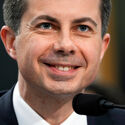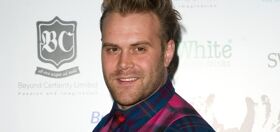 The justices asked tough questions of both sides during oral argument, particularly Justice Kennedy and Chief Justice Roberts who are often believed to be “swing votes.” Throughout their peppering questions, neither clearly tipped their hat in any meaningful way.
The justices asked tough questions of both sides during oral argument, particularly Justice Kennedy and Chief Justice Roberts who are often believed to be “swing votes.” Throughout their peppering questions, neither clearly tipped their hat in any meaningful way.
While proponents and opponents alike will take little solace in reading the tea leaves, the rigorous exchanges are important for preserving the integrity of the judicial process and the Court’s legitimacy.
Justice Kennedy’s questions suggest that he is torn between seeing marriage as an institution intended to confer dignity on spouses and an institution that for millennia was understood to be between a man and a woman. There should be caution in reading too much into this. Justice Kennedy mentioned this tension in his pro-marriage equality decision in Windsor. Kennedy’s questioning of the attorney representing the states provided the most insight when the states’ representative argued that marriage is not about conferring dignity on spouses. Justice Kennedy responded that the whole point was recognizing that same-sex couples “have a dignity that can be fulfilled” in marriage.
For the Chief Justice, the crux of his questions seem to rest on questions of the democratic process and whether the Court would prematurely end debate on same-sex marriage if the justices rule in favor of the couples in June. Those lines of questions are noteworthy, in part, because the Chief Justice almost certainly played an important role in expanding marriage from 19 states to 37 states in the last six months by denying petitions to hear other marriage cases and rejecting applications to delay the implementation of decisions favoring same-sex marriage.
How about we take this to the next level?
Our newsletter is like a refreshing cocktail (or mocktail) of LGBTQ+ entertainment and pop culture, served up with a side of eye-candy.
Most observers going into oral arguments believed that same-sex marriage proponents will win when the Supreme Court rules in June. Nothing today gives cause to believe those initial predictions are wrong.
Anthony Michael Kreis is a doctoral student at the University of Georgia’s School of Public and International Affairs, specializing in sexual orientation, judicial decision making, social change and the law. He holds a law degree from Washington and Lee University. Since 2010, he’s worked on religious liberty issues in proposed same-sex marriage legislation. He is the author of a series of articles and is currently working on a book length project the courts and same-sex marriage.


















Giancarlo85
Kennedy is always like this. He did this before he had a key hand in gutting DOMA. Kennedy always plays devil’s advocate. It is the gauge how compelling the arguments for overturning the bans are. I think he got his answer quote clearly.
aequalitasTN
@Giancarlo85: Exactly! It will play out the same here as it did with US v. Windsor. Although, given the Chief’s line of questioning, his individual dissent focusing on procedural issues in US v. Windsor, and the fact that he was almost assuredly the one voting not to grant certiorari with the others on the October cases, I have high hopes that this one will come down as a 6-3 and the Chief will land on the right side of history. There also seems to be some indication, based on the questioning, that sexual orientation finally be assigned intermediate scrutiny in this opinion which could mean better protections on the federal level against employment, public accommodation and housing discrimination, since Congress is clearly too inept to pass ENDA.
benandy
The chief could well have been the single vote that denied Certiorari in the 9th, 10th, 4th and 7th Circuits. Remember how a case comes to the Supremes:
1. A case is submitted by either side up from a lower court [you can skip the Appeals Courts but the Supremes don’t usually grant review of District Courts].
2. At least ONE Justice requests a review of that case. If NO Justice does, the case has been “decided” as it stands and Certiorari is denied at that point.
3. After at least ONE Justice requests it, the case is discussed in conference. It might be discussed in more than one conference. If at least FOUR Justices vote to grant Certiorari, that case will be heard as the marriage cases were today. If not, it might come back to another conference or be denied. Denial takes either 4 or 5 Justices. So, I’m thinking in the 10th, 4th, 9th and 7th the Cons didn’t have the votes to review those Appellate decisions OR they weren’t willing to risk LOSING at that point. And so a whole bunch states got ME due to the denial of Cert.
4. When the stays stopped happening, it might be that then the Cons didn’t have 5 votes to issue a stay. It could well be that Kennedy and the 4 Prog Justices were perfectly willing to let it run as long as possible w/o stopping the progress in the various states/appellate circuits, leading us to being only 13 states shy of ME nationwide [and PR and the Territories]. And if the 4 Cons “played chicken”, Kennedy and the Gang of 4 could also have had the hearing like we had today and simply affirmed the Appellate ruling. Posner’s would have been my favorite, but Reinhardt’s out of the 9th would certainly work or the one out of the 10th based on Richard Shelby’s ruling in UT, priceless. But, they didn’t push the issue. So, it is Jeffrey Sutton in the 6th who gets to be overturned. Sad for him.
AlliterationAddict
I think that anybody who follows SCOTUS knows that Kennedy and Roberts tend to play it coy with their questioning, especially on a case where everybody is looking towards them as the swing votes. That doesn’t mean that they are guaranteed to rule in favor of marriage equality. It just means that their lines of questioning today don’t mean anything when it comes to the final ruling.
Jaroslaw
@AlliterationAddict: Yes, Kennedy and Roberts tend to play it coy, but why does Kennedy have to say marriage has always been thus and so for millenia? There have been Gay marriages in other societies and marriage is almost an about face compared to what it was just 200 years ago. To say nothing of the “millenia”. So since it is almost a completely different institution, why does it matter? Marriage today in the modern world is a contract sure, but it also about benefits, inheritance, auto insurance discounts etc!!!!!
Giancarlo85
@Jaroslaw: For someone with such superior legal intellect, you seem to know very little about the history of Kennedy. He plays devil advocate. Do you know what that means? You are clueless.
corey
Time to Raise the Alarm: The Texas Strategy to Lock in Anti-LGBT Discrimination
Source:http://tfninsider.org/2015/04/29/time-to-raise-the-alarm-the-texas-strategy-to-lock-in-anti-lgbt-discrimination/
Even as the U.S. Supreme Court considers arguments that could lead to a historic ruling on the freedom to marry, it has become increasingly clear that Texas lawmakers are engaged in an aggressive strategy to lock in discrimination against lesbian, gay, bisexual and transgender people. If that strategy successful in the Lone Star State, we’ll almost certainly see it used in other states across the country. The Texas Freedom Network today joined with the ACLU of Texas and Equality Texas in sending out the following press release:
Civil liberties groups warned today that Texas lawmakers are leading the way on a strategy to subvert a potential Supreme Court ruling in favor of same-sex marriage and enshrine discrimination against gay and transgender people in state law.
Bills now moving in the Texas Legislature go far beyond discriminatory bills that sparked uproar recently in Indiana and Arkansas, said Terri Burke, executive director of the ACLU of Texas.
“Under the guise of protecting religious liberty, Texas lawmakers are pioneering an aggressive strategy for preserving the right to discriminate against gay and transgender families no matter what the Supreme Court says about marriage,” Burke said. “The bills that are the foundation of this strategy are gaining traction and together are much worse than what we have seen elsewhere.”
Two such bills have already received the approval of House committees and await floor votes.
HB 4105 would bar public funding to license or recognize the marriages of gay and lesbian couples, even if the U.S. Supreme Court rules that state bans on such unions are unconstitutional. As of Tuesday, at least 54 members of the Texas House had signed on as co-authors of the bill.
Another bill already approved in committee, HB 3864, would allow child welfare agencies and providers to discriminate against LGBT families for religious reasons. At least 20 other bills would also promote and even require discrimination against LGBT individuals as well as couples. All could advance as stand-alone bills or be tacked on as amendments to other legislation.
The strategy to pass bills that lock in discrimination against gay and transgender Texans could lead to months and even years of litigation, said Kathy Miller, president of the Texas Freedom Network.
“Dragging this battle out in lengthy litigation appears to be a central part of the strategy to stonewall equality,” Miller said. “That would impose great harm, financial and otherwise, on loving families simply trying to exercise their constitutionally protected rights.”
Texas lawmakers appear determined to make the same mistakes that brought severe business and public backlashes in other states, said Chuck Smith, executive director of Equality Texas.
“Businesses have already made clear in Texas, as they did in Indiana and Arkansas, that they are wary of moving to states with a reputation as intolerant and unwelcoming,” Smith said. “Legislators should have Texas join the rest of the nation in embracing equality under the law for everyone, regardless of sexual orientation or gender identity.”
The ACLU of Texas, Texas Freedom Network and Equality Texas have joined together in an initiative – TexansEqualUnderLaw.com/marriage_backlash – in opposition to the proposed discrimination bills.
ACLU of Texas is a guardian of liberty, working daily in courts, the Legislature and Texas communities to defend and preserve the individual rights and liberties guaranteed to all in the Bill of Rights of our Constitution. The Texas Freedom Network is a nonpartisan, grassroots organization of religious and community leaders who support religious freedom, individual liberties and public schools. Equality Texas works to secure full equality for lesbian, gay, bisexual, and transgender Texans through political action, education, community organizing, and collaboration.
Jaroslaw
Corey – I’ve read a lot about Boswell, his detractors and other writers on this topic. A “Same sex union” certainly was not always or maybe not even usually, the same as a marriage, Boswell’s own book says as much. Of course, Boswell is not alive to defend himself but I would hope most of his source4 material was still available for further research. I mean, even without knowing all the ancient languages and historical context, if same sex unions were exactly the same as marriage, then I have to wonder why they were a separately named ceremony? There is much more, of course. I totally agree, though, with the spirit of your post, it is just as much of a deception to make no reference to a very strong likelihood Sergio & Bacchus were lovers or to act as though marriage has always and only been between men and women.
corey
When Same-Sex Marriage Was A Christian Rite.
By ThosPayne
[Excerpt]
A Kiev art museum contains a icon from St. Catherine’s Monastery on Mt. Sinai in Israel, showing two robed Christian saints, St. Sergius and St. Bacchus. Between them is a traditional Roman ‘pronubus’ (a best man), overseeing a wedding. It is Christ.
They angered Emperor Maximian when exposed as ‘secret Christians’ by refusing to enter a pagan temple, were sent to Syria circa 303 CE where Bacchus is thought to have died while being flogged. Sergius survived torture, later beheaded.
Their close relationship has led many modern scholars to believe they were lovers, the most compelling evidence, the oldest text of their martyrology, the NT Greek describes them as “erastai,” or “lovers”. Contrary to myth, Christianity’s concept of marriage hasn’t been set in stone since Christ, but has constantly evolved as a concept and ritual.
For the Church to ignore evidence in its own archives would be cowardly and deceptive. It proves that for the last two millennia, in parish churches and cathedrals throughout Christendom, from Ireland to Istanbul,
in heart of Rome itself, homosexual relationships were accepted as valid expressions of a [Christian] god-given love and commitment to another person, a love that could be celebrated, honored and blessed, through the Eucharist in the name of, and in the presence of, Jesus Christ.
Source: http://www.christianity-revealed.com/cr/files/whensamesexmarriagewasachristianrite.html
AlliterationAddict
@Jaroslaw: I see where you’re coming from. But Kennedy is the kind of justice who sees it as his role to challenge both sides, and that means asking these types of questions. Presumably, it is in the interest of setting up responses such as your own. Also, given Kennedy’s legal style, if he were planning to rule against marriage equality, he’d come at it from a states rights or procedural angle. The fact that he didn’t ask those kinds of questions is a really good sign. Especially with him lobbing softballs at the marriage equality side.
Giancarlo85
Kennedy has a long history to test the elasticity and veracity of legal arguments. Kennedy didn’t come towards the question with a slant towards states rights. He didn’t even get to those points as AlliterationAddict has said.
jwtraveler
I’m not panicking. Neither my life nor the fate of the world revolves around the issue of gay marriage.
1EqualityUSA
jwtraveler, it will be very difficult to continue to pay taxes to a government who doesn’t treat us equally. We will not be second class citizens in our own country.